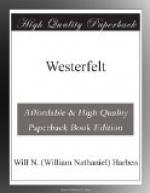“Yes, mother. I heard every word you said about pa an’ the woman. I heard that, and I heard them frogs down there croaking, too, and the chickens fluttering on their roosts. I heard his horse still a-trotting. Mother, he was whistling when he drove up just now—whistling!”
The two stared into each other’s eyes for a moment, then the old woman went on:
“It’ll go powerful hard with you now, but you’d better have it over with when you’re young ’an to suffer when you’re a weak old woman like me. Ol’ age cayn’t stand such things so well. No, I never once mentioned the woman to yore pa. I knowed it would jest make him resort to lyin’, an’ at the bottom he was a good, pious man. He jest couldn’t quit thinkin’ o’ that yaller-headed woman an’ her blue eyes an’ shiny store shoes. I jest pitied ’im like he was a baby. It went on till he got sick, an’ many an’ many a day he’d lie thar helpless an’ look out towards the cow-lot, wistful like, an’ I knowed he was thinkin’ o’ that pictur’. He was lookin’ that way when he drawed his last breath. It may ‘a’ been jest a notion o’ mine, fer some said he was unconscious all that day, but it looked that away to me. I nussed him through his sickness as well as I could, an’ attended to every wish he had till he passed away. Now, you know some’n’ else, Sally. You know why I never put up no rock at his grave. The neighbors has had a lots to say about that one thing—most of ’em sayin’ I was too stingy to pay fer it, but it wasn’t that, darlin’. It was jest beca’se I had too much woman pride. When I promised the Lord to love an’ obey, it was not expected that I’d put up a rock over another woman’s man if he was dead. Sally, you are a sight more fortunate than you think you are.”
Sally rose, the steely look was still in her eyes, her face was like finely polished granite. Mrs. Dawson got up anxiously, and together they passed through the gate. They could see the red fire of Peter Slogan’s pipe, and the vague form of his wife standing over him.




